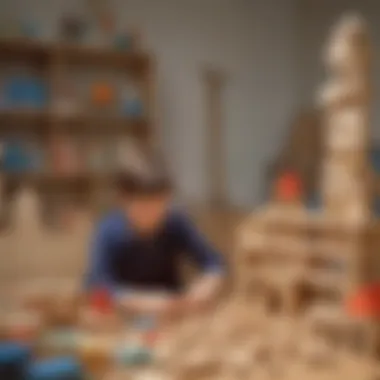Unlocking the Intricacies of Piaget's Play Developmental Stages


Interactive Learning Games
Educational Topics
- The exploration of Piaget Stages of Play theory unveils a fascinating progression in children's cognitive development through play. Unravel the intricate details of each stage to glean an in-depth understanding tailored for parents, educators, and caregivers. Witness how children navigate through various play stages and experience enhanced cognitive development. Learn how to support children's growth and development through a holistic approach to learning.
- Tips and Tricks
- Delve into practical tips designed for parents and educators to enrich children's learning journeys. Uncover strategies to make learning engaging and enjoyable, fostering a conducive environment for children's cognitive growth and development. Discover innovative ways to navigate play behaviors and support children in unlocking their full potential.
Creative DIY Projects
Step-by-Step Guides
- Embark on a creative journey with detailed instructions for engaging DIY projects aimed at promoting creativity in children. Understand the benefits of hands-on activities in enhancing children's cognitive and motor skills, unlocking their creativity and fostering a sense of accomplishment.
Craft Ideas
- Explore a collection of imaginative craft ideas utilizing simple household items to ignite children's artistic expressions. Discover the importance of artistic expression in children's holistic development, encouraging creativity and self-expression while nurturing their cognitive abilities.
Introduction to Piaget Stages of Play
Overview of Jean Piaget's Developmental Theory


Jean Piaget's developmental theory stands as a pillar in child psychology, revolutionizing our understanding of how children perceive and interact with the world around them. This visionary framework outlines the distinct stages of cognitive development that individuals progress through from infancy to adulthood, highlighting the intricate processes of assimilation and accommodation. By providing a roadmap for understanding how children construct knowledge and make sense of their experiences, Piaget's theory offers invaluable insights for educators and caregivers to support children's holistic development.
Significance of Play in Child Development
Play serves as a cornerstone in children's development, serving multifaceted roles in fostering cognitive, socio-emotional, and physical skills. Through play, children engage in symbolic representation, problem-solving, and social interaction, laying the foundation for crucial learning and development. From imaginative role-playing to cooperative games, play activities stimulate creativity, enhance decision-making abilities, and promote emotional regulation. Understanding the profound impact of play in child development is paramount for creating enriching environments that nurture children's holistic growth and well-being.
Sensorimotor Stage
The Sensorimotor Stage is a crucial phase in child development, as outlined in the Piaget Stages of Play theory. This stage, typically observed in infants from birth to around 2 years old, is characterized by the child's exploration of the world through their senses and actions. It lays the foundation for future cognitive growth and is essential for building various skills and abilities.
Characteristics and Activities
During the Sensorimotor Stage, children engage in sensory exploration and motor activities to understand their environment. They do so by touching, tasting, smelling, seeing, and hearing objects around them. Furthermore, this stage is marked by the development of basic motor skills such as grasping, crawling, and eventually walking. These activities help children learn cause and effect relationships and develop a sense of agency over their actions.
Role of Sensory Input and Motor Skills
Sensory input and motor skills play a vital role in shaping a child's cognitive development during the Sensorimotor Stage. Through sensory experiences, such as feeling different textures or hearing various sounds, children begin to differentiate between objects and understand how the world works. Motor skills, including reaching for objects or crawling towards a desired toy, enable children to actively engage with their surroundings and refine their coordination.
Object Permanence Development
A significant milestone achieved during the Sensorimotor Stage is the development of object permanence. This concept involves understanding that objects continue to exist even when they are out of sight. For example, a child realizes that a toy hidden under a cloth still exists and can be retrieved. This newfound awareness showcases the child's cognitive growth and sets the stage for more advanced forms of play and problem-solving.
Preoperational Stage


The essence of the Preoperational Stage lies in the child's ability to engage in symbolic play and create imaginary worlds through pretend scenarios. This form of play not only entertains children but also fosters their cognitive development by enhancing language skills, problem-solving abilities, and social interactions. By immersing themselves in make-believe situations, children expand their creativity and emotional intelligence, enabling them to explore different roles and perspectives.
One must consider several key elements when delving into the Preoperational Stage. Firstly, caregivers and educators should recognize the importance of encouraging and supporting children's imaginative play, as it serves as a vital mode of self-expression and emotional understanding. Secondly, understanding the role of symbolic play in cognitive development can guide the design of learning environments that stimulate children's creativity and critical thinking skills. Additionally, acknowledging the influence of pretend scenarios on social skills and empathy development highlights the interconnected nature of play and emotional growth during this crucial developmental stage.
In summary, the Preoperational Stage plays a fundamental role in shaping a child's cognitive abilities and social interactions. By embracing the significance of symbolic play and pretend scenarios, parents, educators, and caregivers can enrich children's play experiences, providing them with a nurturing environment that supports holistic development.
Symbolic Play and Pretend Scenarios
Symbolic play and pretend scenarios are central components of the Preoperational Stage in child development. During this phase, children engage in imaginative play where objects and actions represent something other than themselves, fostering creativity and abstract thinking.
Symbolic play allows children to explore and express their ideas, emotions, and experiences in a symbolic manner. By pretending to be someone else or assigning roles to objects, children develop their language skills, emotional understanding, and social awareness. Through these play scenarios, children exercise their cognitive abilities by creating and navigating fictional worlds, enhancing their problem-solving skills and creativity.
Educators and parents play a crucial role in nurturing symbolic play by providing children with environments rich in diverse stimuli and open-ended materials that encourage imagination and exploration. By fostering a safe and supportive space for children to engage in pretend scenarios, caregivers can promote cognitive development and emotional intelligence, laying a strong foundation for future academic and social success.
Egocentrism and Lack of Conservation Understanding
Egocentrism and lack of conservation understanding are notable characteristics of the Preoperational Stage, influencing a child's perception of the world around them. As children navigate this developmental phase, they exhibit egocentric tendencies, focusing primarily on their own perspective and struggling to grasp viewpoints different from their own.
The concept of conservation, encompassing principles such as mass, volume, and number, poses challenges for children in the Preoperational Stage. Children at this age often struggle to understand that certain properties remain constant despite changes in physical appearance, leading to misconceptions and misconceptions in tasks that require conservation understanding.
Egocentrism in children can impact their social interactions and communication skills, as they may have difficulty empathizing with others or considering alternative viewpoints. Lack of conservation understanding may present obstacles in academic settings, affecting tasks that involve logical reasoning and problem-solving. Understanding these aspects is crucial for caregivers and educators to provide tailored support and scaffolding to help children overcome egocentrism and develop conservation concepts.
Imitation and Role-Playing


Imitation and role-playing are essential activities during the Preoperational Stage, enabling children to explore different roles and social interactions. Imitation allows children to mimic behaviors and actions observed in their environment, facilitating learning and socialization.
Role-playing, on the other hand, involves children taking on specific roles and engaging in scenarios that require cooperation, communication, and negotiation with peers. Through imitation and role-playing, children develop empathy, perspective-taking skills, and understanding of societal norms, laying the groundwork for more complex social interactions in later stages of development.
Caregivers and educators can support imitation and role-playing by providing opportunities for children to engage in pretend play, supplying props and costumes that spark creativity, and encouraging cooperative play with peers. By promoting these activities, adults can foster children's social and emotional development, building essential skills for navigating relationships and understanding societal roles.
Concrete Operational Stage
In the realm of child development, the Concrete Operational Stage stands as a pivotal phase that marks significant cognitive advancements in children. This stage, which typically occurs between the ages of 7 and 11, plays a crucial role in shaping a child's ability to think logically and engage in concrete problem-solving tasks. Understanding the Concrete Operational Stage is paramount in this article as it showcases the transition from earlier stages of play to more structured and organized play activities, reflecting the child's burgeoning cognitive capacities.
By delving into the specifics of the Concrete Operational Stage, we uncover profound insights into the budding abilities of children, particularly in terms of their heightened logical reasoning skills and their capacity to think more systematically. At this stage, children start demonstrating improved cognitive functions, allowing them to categorize objects based on multiple characteristics and perform tasks that involve concrete thought processes.
Moreover, the Concrete Operational Stage also emphasizes the importance of hands-on learning experiences and practical applications of knowledge. Children begin to master the art of problem-solving through tangible methods, engaging in activities that require a deeper level of understanding and reasoning. By honing their concrete thinking skills, children lay a solid foundation for future academic success and critical thinking abilities.
Understanding the Concrete Operational Stage entails recognizing the significance of this phase in a child's cognitive development journey. By acknowledging and fostering the growth of logic and concrete thinking during this stage, parents, educators, and caregivers can nurture children's cognitive skills effectively, providing them with opportunities to excel academically and intellectually. The Concrete Operational Stage serves as a stepping stone towards higher cognitive functions, setting the stage for more complex cognitive abilities to emerge in later developmental stages.
Formal Operational Stage
The Formal Operational Stage is a pivotal phase in the Piaget stages of play, encapsulating the pinnacle of cognitive development in children. This stage, featured prominently in this article, marks a significant advancement in a child's ability to engage in complex thought processes, including abstract thinking, problem-solving, and hypothesis formation. By focusing on the Formal Operational Stage, we delve into specific elements that highlight the maturation of a child's cognitive capabilities, paving the way for enhanced intellectual growth and reasoning skills.
Abstract Thought and Hypothetical Situations
Within the Formal Operational Stage, Abstract Thought and Hypothetical Situations play a central role in shaping children's cognitive landscapes. This subsection explores how children at this stage develop the capacity to think beyond the concrete and tangible, delving into the realm of abstract concepts and ideas. By analyzing the intricacies of abstract thinking and its application in problem-solving scenarios, readers gain insight into the transformative power of engaging with hypothetical situations, fostering creativity, and expanding mental boundaries.
Imaginative and Strategic Play
Imaginative and Strategic Play emerges as a fundamental aspect of the Formal Operational Stage, emphasizing the fusion of creativity and strategic thinking in children's play behaviors. In this section, we uncover the significance of imaginative play in encouraging self-expression, emotional exploration, and cognitive flexibility. By elucidating how strategic play contributes to honing decision-making skills and social dynamics, readers witness the dynamic interplay between imagination and logic, fostering holistic development in children within this developmental stage.
Application of Logical Reasoning in Play
The Application of Logical Reasoning in Play represents a key component of the Formal Operational Stage, showcasing how children harness logical thinking to navigate increasingly complex play scenarios successfully. By elaborating on how logical reasoning underpins problem-solving, decision-making, and critical analysis during play activities, readers gain a deeper understanding of how children at this stage refine their cognitive processes. This subsection highlights the pivotal role of logical reasoning in enhancing children's cognitive agility and instilling a solid foundation for advanced problem-solving skills in various real-world situations.















